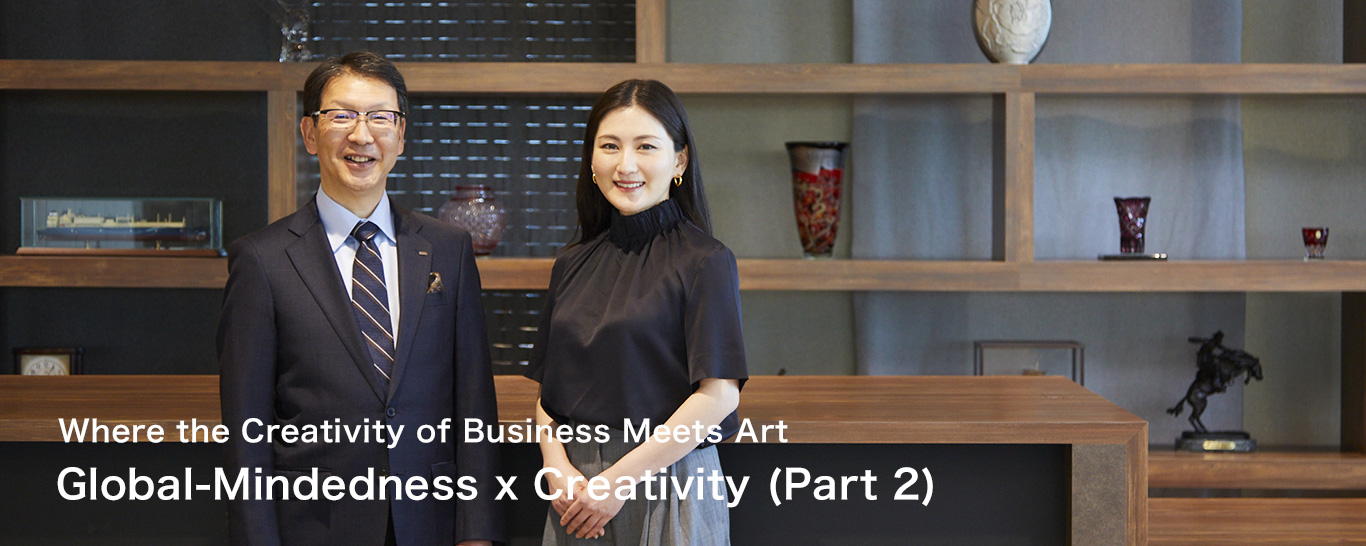
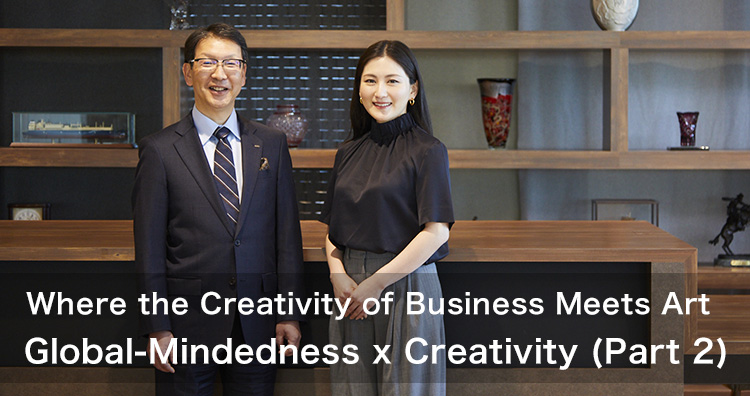
Where the Creativity of Business Meets Art
Global-Mindedness x Creativity (Part 2)
4 April 2023
Okuda:In our previous conversation, I felt that some of the keys to your global success were your decisiveness, differentiation strategy, and ability to spot opportunities. Today, I’d like to hear more about your recent activities and delve further into how global-mindedness can intersect with creativity.
After establishing your reputation in Europe, you went on to acclaim in Argentina as well. What prompted you to go there?
Tanaka:Buenos Aires was built by European immigrants, so historically, classical music has been very popular there. The city has produced incredibly famous musicians like Martha Argerich and conductors like Carlos Kleiber. It’s also located in the southern hemisphere, so the seasons are the opposite of Europe. When Europe is in its summer off-season, it's winter in Buenos Aires, which coincides with its classical concert season. There is also a long tradition of exchange between musicians, and popular European artists are often invited to perform there. So in Europe, performing a concert in Buenos Aires has become a status symbol for musicians. Thanks to this historical connection, I also received offers to perform, which was the start of my relationship with the city.
Throughout my career, I've become less interested in satisfying myself and more interested in having an impact on others. If my singing can have a positive influence on someone, it makes me want to work that much harder. (Tanaka)
Okuda:I heard you received an award for best premiere for your concert in Buenos Aires and that you are also now focusing on your work with youth orchestras. What inspired this new direction?
Tanaka:About ten years ago, I realized that I wanted my singing to become a means for positive change. Over the course of my career, I've become less interested in satisfying myself and more interested in having an impact on others. If my singing can have a positive influence on someone, it makes me want to work that much harder. Over that time, I started to receive messages from young teenagers who asked me about wanting to be a musician but not knowing where to start. Others told me they wanted to pursue music but didn’t have encouragement and were thinking of giving up. It made me think about what I could share with the many people who felt a glimmer of hope when they saw me in my career as a soprano, despite my unusual background. I didn’t follow the conventional route of attending music school, for example.

Around that time, I went to Buenos Aires to perform, which has a beautiful urban center similar to Paris. But just outside the city, there are slums, which are informally known as "villas." I had seen slums like these in Eastern Europe before, but the villas outside Buenos Aires were much worse than anything I had experienced before. I still vividly remember being told by someone from Argentina that from anywhere else in the world, Japan seems like a fairyland. We have access to clean water, we don't have to worry about food, and toilet paper is readily available. This is not the norm when you look at other places in the world. Their point was that we should cherish our living standards in Japan and realize that our reality here is not the reality for most people. That conversation was a turning point for me— realizing how subjective our experiences are. The same goes for children. I became very concerned about the hardships children living in the slums faced every day.
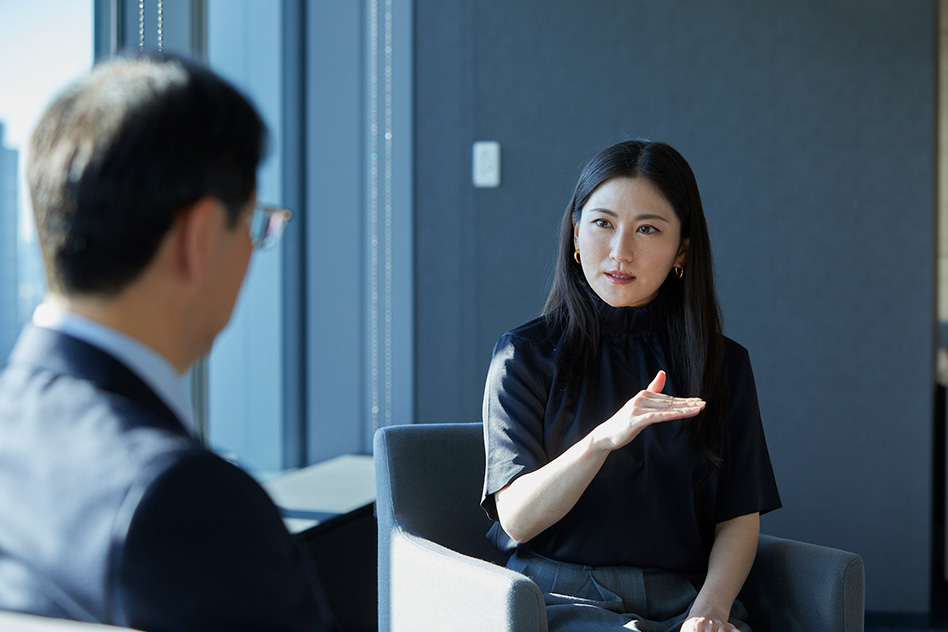
In Buenos Aires, wealthy children and children from the slums were equal on the stage. I wanted Japanese children to see that. (Tanaka)
Tanaka:After that experience, I learned about an orchestra in Buenos Aires that brings together children from different backgrounds. It was terrific that the orchestra included wealthy children and those from the slums, all performing together. While there are youth orchestras for impoverished children in countries around the world, this was the first time I had heard of this kind of orchestra, so I became very interested in learning how it was organized, who was supporting it, and how the children were selected. Until then, I had subconsciously drawn a line between rich and poor children, but upon seeing them perform together on stage, I saw equal ability. I was shocked and ashamed of myself for having made such a distinction. No matter our country or background, the idea that all children are the same may not be so common after all. So, I was instantly captivated when I learned about how the organization that runs this orchestra works. After seeing the children work so hard, I wanted to share their stories with children in Japan, and I started thinking about different ways I could help. That was how my work with the youth orchestra in Argentina began.
Your story aligns with issues of ESG and diversity that companies face today. (Okuda)
Okuda:It sounds like you’ve really connected with these children on an emotional level. Being able to respond with such passion to what you see and hear must come from being both highly sensitive and immensely curious. The story you just shared closely relates to issues of ESG (environmental, social, and governance) and diversity that many companies face today. With ESG, companies are not only asked to pursue profits but also to consider what value they can give back to society. On the other hand, diversity is about creating a culture of respect between people with different values and abilities, ultimately strengthening both the company and society. Your story certainly aligns with these two concepts.
And as you said, Japanese people need to recognize that life in Japan can seem like a fairy tale. We live in a society that's already been molded in ways that we take for granted, like our access to gas and electricity. If we feel cold in winter or hot in summer, we can return to the comfort of our air-conditioned homes. And we enjoy these conveniences without giving them a second thought. JERA has businesses in developing countries across Asia, and whenever we go somewhere new, basic utilities like these are often unavailable. JERA's mission is to “provide cutting-edge solutions to the world's energy issues,” and we are keenly aware that each country will have unique challenges that require unique cutting-edge solutions.
Okuda:Let’s change direction and talk about “Garasha,” the mono opera you are currently working on in Japan. How did this project come about?
I wanted to explore the Japanese identity and create something that shows what emerges when Japanese people come into contact with European culture. (Tanaka)
Tanaka:There are three main reasons why I decided to take on this project.
First, I began to think about my identity as a Japanese person when the years I'd spent living in Europe surpassed my years in Japan. I wanted to create something that shows what emerges when Japanese people like me come into contact with European culture and wanted to see what would happen if we looked at Japan from both Japanese and Western perspectives rather than creating something from the standpoint of one or the other. I wanted to create something tangible to mark the year I had spent equal time in Japan and Europe. That's the first reason.
The second reason is that I wanted to create an opera with a princess as the main character—a strong female figure from Japanese history—because I am a woman myself. "Madame Butterfly" is generally considered the most famous Japanese-themed opera, but I personally don't like Madame Butterfly's attitude toward life. If I think about it rationally, as a Japanese woman, I find the content objectionable, so I thought we could offer another perspective.
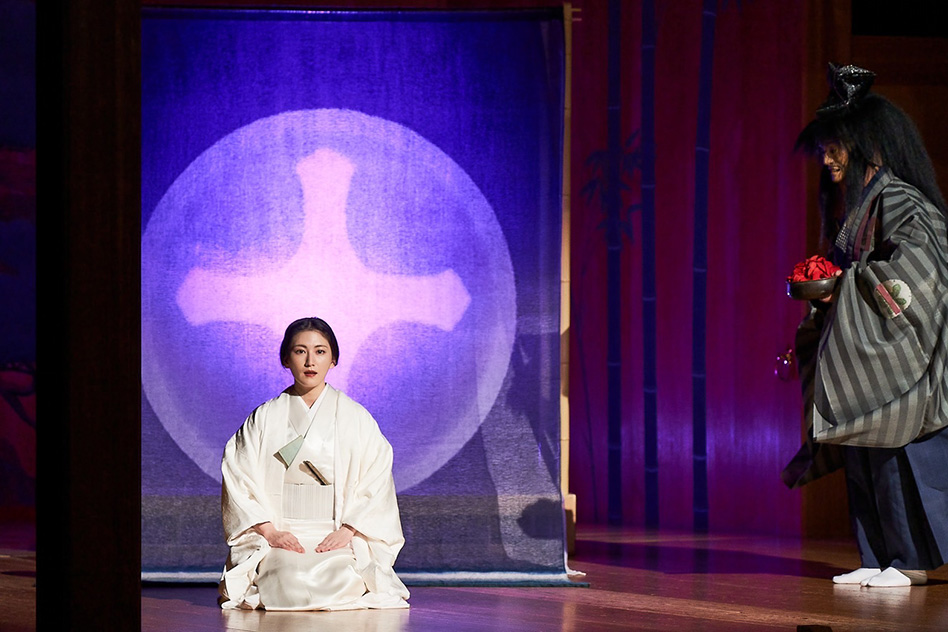
Credit: Tadayuki Minamoto
I wanted to create a new kind of opera with a half-Japanese, half-European team. (Tanaka)
Tanaka:The third reason is that I wanted to create an opera with a team that was half European and half Japanese, which I thought would help maintain a creative balance. If the entire team were European, the story might seem strange to a Japanese audience. On the other hand, if everyone were Japanese, it might be difficult for a non-Japanese audience to follow. I wanted to incorporate Japanese and European perspectives to create something new while avoiding issues like these. However, the art of opera is Western by nature, so when incorporating elements of Japanese culture, I became interested in Noh theater, which I wanted to explore.
I had the honor of asking Esteban Benzecry, one of the most prolific composers in Europe and South America today, to compose the music. When I first approached him about writing something, he told me he thought a Japanese composer would be better since the subject matter was about Japan. But I told him, “No, that's not what I want. I want to see Japan through your eyes. I want you to create the music of Japan as you feel it.” When the first piece was completed, it included a part that sounded like a Chinese gong, and when I asked him about it, he said that he thought that was what Japan was supposed to sound like. So, I put my foot down and told him I wanted him to stop including things just because they might “sound Japanese.” Instead of thinking about Japanese tropes, I wanted him to read the story and create music based on his own feelings, and he agreed to rewrite the score.
I assembled the scriptwriter and cast members independently, contacting them directly over the phone and via social media. (Tanaka)
Tanaka:On the one hand, I thought having a Japanese writer author the script would be best. And coincidentally, I came across a book by an author who happened to be living in Kyotango, the area where the titular character Garasha had been confined. When I searched for the author's name online, I found all of his information, including his address. The internet can be scary, can’t it? [laughs] I looked him up in the yellow pages and found two people with the same name. I called the first number, and it turned out to be the author. I said, “My name is Ayako Tanaka, and I'm creating an opera. Would you be willing to write the script?” Despite my suspicious phone call out of nowhere, he agreed, which led me to Kyotango to speak with him in person upon my return to Japan. I contacted all the other cast members directly via Facebook or other social media who agreed to join the production. It all felt very twenty-first-century. Perhaps this was also because I had to do everything myself since I wasn't affiliated with an agency at the time. I'm grateful for everyone's cooperation, and I think it proved this kind of approach is valid.
Your approach is similar to that of a startup, where a clear vision allowed you to assemble a team of diverse talent from around the world. (Okuda)
Okuda:That’s amazing. You sound like the founder of a startup. It’s almost as if you’re an entrepreneur, doing everything yourself. You had a clear vision and didn't want to create a traditional Japanese Noh performance. But you also wanted to create something that transcended a Western opera. It sounds like you wanted to create something new by blending both sets of values into something that would have global appeal but with a Japanese twist. That deep-seated desire inspired you to contact and assemble a diverse and talented team with different values and skills from around the world. I don't think anyone would have gotten on board without such a clear vision. I would love to have you talk with the leaders of venture-backed startups in one of our upcoming expert panels. I think they will be quite surprised by how much your story overlaps with their own.
You may already be aware of this, but you've done everything by the book when it comes to successful business strategy. You never passed up even the slightest opportunities and were decisive when they came along. Then there's your differentiation strategy— you were able to reflect on your strengths. Of course, many other people outside Japan may have more powerful voices than you. But when competing with them, you concentrated your resources on your strengths, just like a business would. That's why you've been so successful. It's clear that, behind the scenes, you've been applying best practices for business success by your very nature.
Tanaka:Thank you. I'm happy to hear you say that.
Business and art exist fundamentally on the same playing field in terms of value creation. (Okuda)
Okuda:Our conversation so far has got me thinking that business and art exist fundamentally on the same playing field. With the rapid changes to the values of society, companies must adapt and provide new value to survive. In terms of creating new value, I believe that the worlds of business and art are entirely the same.
However, I feel that art is able to respond more quickly to changes in social values. Companies have an assortment of rules to follow, and there is always the bottom line to consider, as shown in our financial statements. Due to these constraints, turning a new value proposition into a proper business takes a fair amount of time. The world of art, on the other hand, is much freer, allowing it to provide new value more quickly.
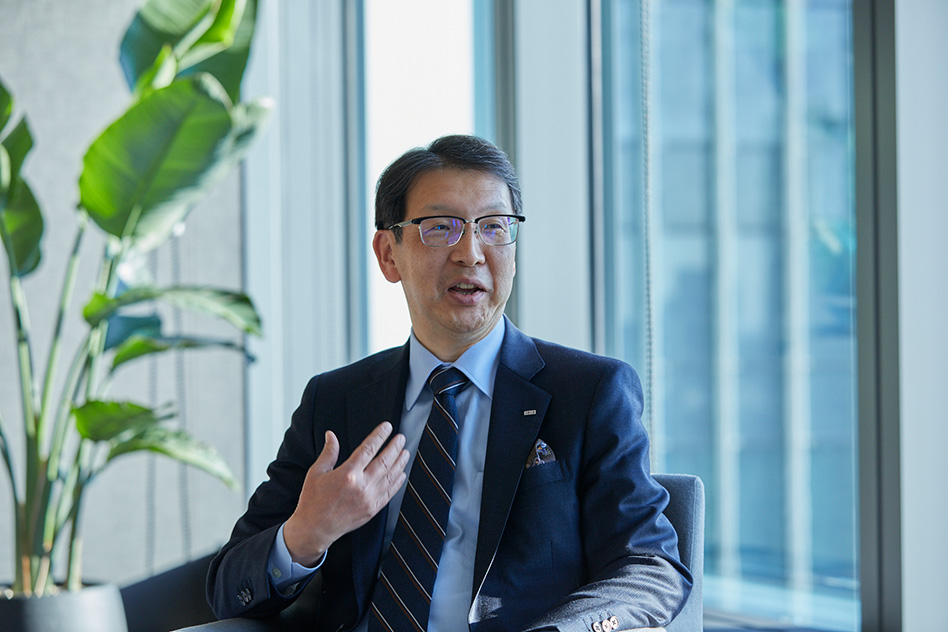
If it wasn't for classical music, JERA might not exist. (Okuda)
Okuda:I've been listening to classical music since I was young, and I feel like it has constantly reflected the latest changes in values, foretelling where businesses would be 20 years down the line. For example, when I was younger, my ears became accustomed to the big, opulent ensembles of Herbert von Karajan, where not a single string is out of tune. But by the time I started frequenting concert halls, orchestras had begun to emphasize the timbre and personality of each instrument and musician. It was as if they were anticipating the challenge of “value creation through diversity” that businesses face today. In retrospect, it's pretty remarkable.
At first, though, I couldn't accept this new sound. I thought, “What is this? This is nothing like what I'm used to hearing.” But when I tried to clear my mind and feel the message behind the music, I could certainly hear a new kind of sound. Sometimes the only way to understand new value is to hit the reset button on your existing values, clear your mind, and listen with a fresh perspective. That experience has proved very helpful in my subsequent business endeavors. It's challenging to clear your mind, and if you can't do it, it’s much harder to come up with new ideas or be receptive to the new ideas of others. We tend to make choices that keep us clinging to vested interests, and we end up living our lives that way.
I was one of the founding members when TEPCO and Chubu Electric Power established JERA, and while it may be a bit of an exaggeration, I believe that the decision to create this new energy business model came about precisely because of my experiences with classical music. Again, if I may exaggerate a little—if I hadn't discovered classical music, JERA might have never existed. That’s one reason I believe art and business are natural bedfellows and should be more closely connected.
There are many similarities. After all, new things are born by emptying yourself and letting the music flow through you. (Tanaka)
Tanaka:You’re right. I, too, notice many similarities as I listen to your story. With sheet music, for example, it's fixed, and you're not supposed to deviate from it. There's no need to go beyond it. Instead, it's all about bringing out and leveraging creativity from within the notes without changing the score itself. And you can't do that unless you can empty yourself and let the music flow through you.
Your performance tends to be influenced by how you've heard others play or sing, so it's essential to try and reset your mind when approaching a piece of music for the first time. Because that's when something new can be born. Listening to your story just now has also been very insightful for me.
Okuda:Apple founder Steve Jobs invented the Apple computer and its iconic logo. One hypothesis suggests that he came up with the logo having encountered Japanese ukiyo-e prints when he was young. The distorted expressions in ukiyo-e convey a unique message that can't be found in paintings from other countries. He discovered the unique value within art and incorporated it into his vision for the world he wanted to create, thereby giving rise to new value. I think it symbolizes the successful integration of art and business. If companies want to provide new value, they must strengthen their connection with the creativity in the arts. And in a broader sense, value creation in business is itself an artistic pursuit.
Tanaka:I completely agree. On the other hand, I think that musicians need to learn more about business. The more we know about each other, the more we can drive innovation.
Okuda:We have had two fascinating discussions. From the perspective of globally viable value creation, we have seen that there are various points where business and art intersect. In our next series of conversations with innovators, we will talk with everyone from academics to entrepreneurs, and I hope to further explore value creation that bridges these worlds. I look forward to speaking with you again.
Tanaka:Thank you.

INTERVIEWER
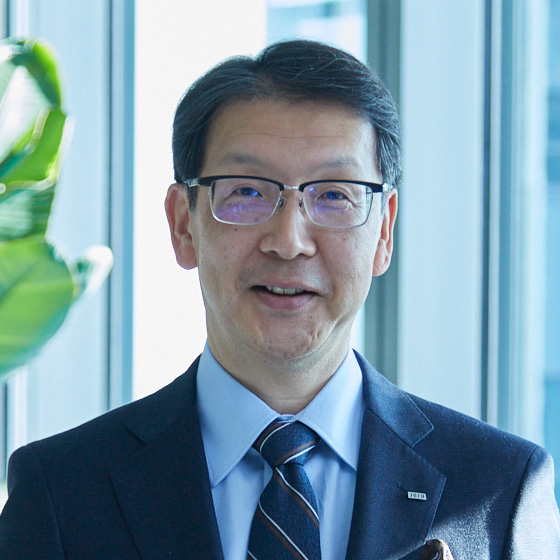
Hisahide Okuda
President, Director CEO & COO
JERA Co., Inc.
Okuda joined Chubu Electric Power Co., Inc. in 1988 and served as General Manager, Strategies & Alliances Office, Head of Corporate Planning & Strategy Division starting in 2017. After being promoted to Senior Managing Executive Officer and Chief Operating Officer of the Corporate Strategy Department in 2019, he served as Director of the Corporate Strategy Department before becoming Corporate Vice President and Senior Managing Executive Officer. In April 2023, he became President, Director, and CEO & COO of JERA Co., Inc.
GUEST
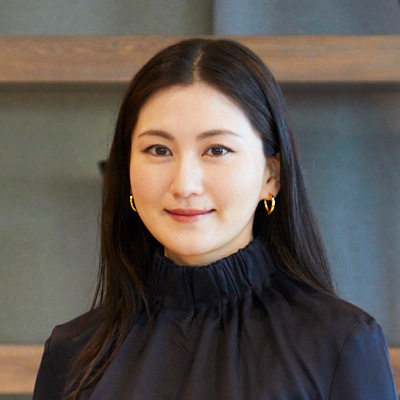
Ayako Tanaka
Soprano singer
CEO, Japan Association for Music Education Program
At the age of 18, Tanaka traveled to Vienna alone to study. At 22, she made her debut at the Stadttheater Bern in Switzerland, becoming the youngest soloist ever in the theater and the first Japanese person to perform there. Since then, she has performed in Vienna, London, Paris, Buenos Aires, and many other cities worldwide. Her premiere concert of „Five Circle Songs for Coloratura Soprano and Orchestra“ composed for her voice by Esteban Benzecry, was chosen the Best World Premiere Piece by the Argentine Music Critic Association. The album received five stars from the BBC Music Magazine, the world's best-selling classical music magazine.
Tanaka is also engaged in giving back to society through activities such as the SCL International Youth Music Festival held in Vienna with the support of UNESCO and the Austrian government to assist young performers, as well as the National Youth Orchestra of Argentina, which was established with the support of the Argentine government to provide education to young people of various backgrounds and family situations through music.
Tanaka was named one of Newsweek's "100 Most Respected Japanese in the World" in 2019. She sang the Japanese national anthem on October 22 at the opening ceremony of the SMBC Nippon Series 2022.
Born in Kyoto, Tanaka lives and works in Vienna.
RELATED STORIES
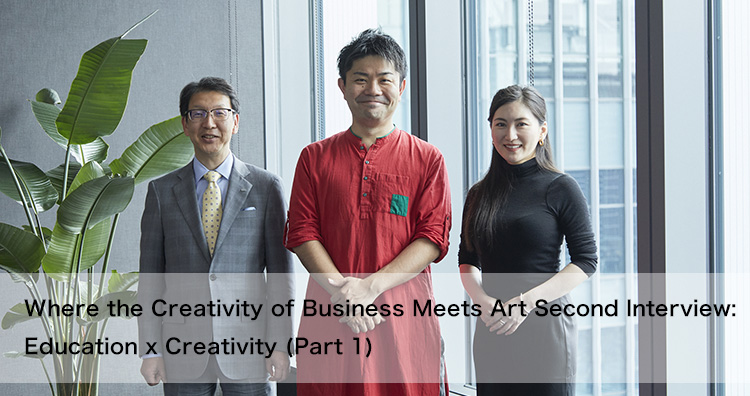
Where the Creativity of Business Meets Art Second Interview: Education x Creativity (Part 1)
Today marks the first time we’re doing a three-person interview. We are joined by Mr. Kaito Miwa, CEO and co-founder of …

Where the Creativity of Business Meets Art Second Interview: Education x Creativity (Part 2)
Recently, I've developed a new presentation style, where I seek to connect with the audience by openly sharing my weaknesses

Where the Creativity of Business Meets Art Second Interview: Education x Creativity (Part 2)
Recently, I've developed a new presentation style, where I seek to connect with the audience by openly sharing my weaknesses

